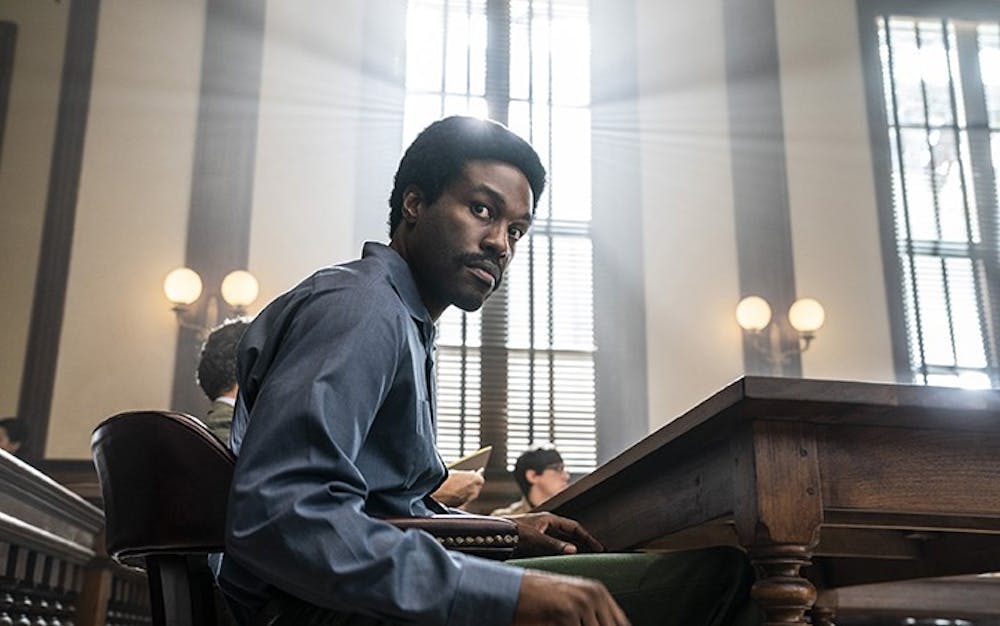Movie: “The Trial of the Chicago 7”
Release Date: Oct. 16, 2020
Director: Aaron Sorkin
Runtime: 2 hours 9 minutes
Genre: Courtroom drama, political thriller
Rating: B+
Protesters chant, “the whole world is watching,” outside a courtroom where eight men are being tried for conspiracy to incite violence during an anti-war demonstration outside of the 1968 Democratic National Convention. This chant, heard repeatedly throughout Netflix’s new film "The Trial of the Chicago 7," is a not-so-subtle wink to the audience, as the film was released just a few weeks before the 2020 presidential election.
"The Trial of the Chicago 7" follows the aforementioned case where anti-Vietnam War protesters Tom Hayden, Abbie Hoffman, Jerry Rubin, Rennie Davis, David Dellinger and their lawyer William Kunstler, stand up against a corrupt system doing its best to silence their movement.
Writer and director Aaron Sorkin is no stranger to politics or courtrooms. Sorkin is famous for creating the show "The West Wing," but it's been a while since he has tackled the political realm.
It's no coincidence that his long-awaited return to politics comes with discontent for the systems that are meant to protect democracy and truth.
His previous political films, such as 1995's "The American President," featured righteous individuals following the law of the land to make change, which feels naïve in the country's current state. "The Trial of the Chicago 7," by comparison, is all about challenging the establishment and the pre-conceived notions Americans have about how noble the country's institutions are.
This is far from the first film to use the Vietnam War to question the legitimacy of the American government — Oliver Stone's 1991 film "JFK" is perhaps the best example of that skepticism — but it does so in a unique way.
Rather than focusing on the Vietnam War itself and the major political players involved, this film takes rather ordinary people and shows how they can be a catalyst for change.
Tom Hayden, played by Eddie Redmayne, is a leader at the "Students for Democratic Society" convention and is essentially the film's protagonist, the sole source of Sorkin's typical democratic optimism. His foil throughout the film comes in the form of fellow defendants Abbie Hoffman and Jerry Rubin, portrayed by Sacha Baron Cohen and Jeremy Strong respectively, who embrace the wildness of 1960s counterculture in order to incite revolution.
Mediating between these strong personalities is William Kunstler, the lawyer for the group, played by Mark Rylance in an incredible performance that should receive attention for awards come Oscar season.
"The Trial of the Chicago 7" is at its finest when these big personalities are hashing out their different political ideologies with intense back-and-forth dialogue.
One standout sequence features Kunstler preparing Hayden to take the stand, where he will be asked about his role in the riots. The film begins cross-cutting between shots of their dialogue and flashbacks of Hayden's actions during the riots.
It's an electric scene that is similar in pace and style to sequences found earlier in Sorkin's filmography — scenes such as the email depositions in "The Social Network" come to mind — but it doesn't coalesce as satisfyingly here as in those previous films.
Sorkin is known for sentimentality, but the constant reminders of the injustice the ongoing trial represents make these moments fall flat.
Multiple scenes showcase police brutality that invokes imagery seen across the country during the protests this summer for the Black Lives Matter movement. There is a particularly upsetting scene in the film where an African American male is bound and gagged in the courtroom — so troubling that it makes later attempts for optimism in the film ring hollow.
The confusion in tone shows growing pains for Sorkin, who is directing his second feature after debuting in 2017 with "Molly’s Game." His snappy dialogue and sentimental tendencies are best when balanced with a sardonic director, but his near-complete authorship on this film removes the potential for that presence.
"The Trial of the Chicago 7," despite its flaws, feels like a modern recreation of the courtroom drama in both theme and technical execution. It’s hard to watch a Sorkin film and not be inspired by America, but for the first time in his career, his love of the country is just for America the people and not America the institution.
As Edward Abbey said, "A patriot must always be ready to defend his country against his government."

